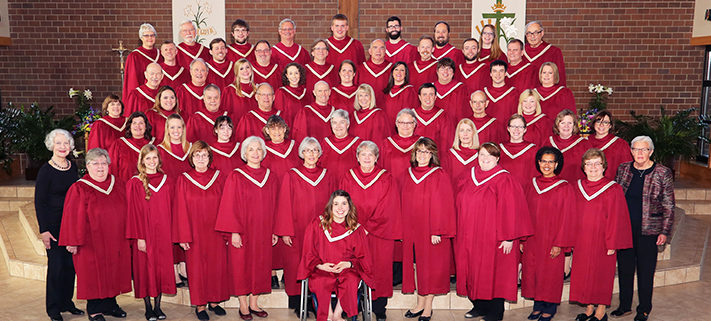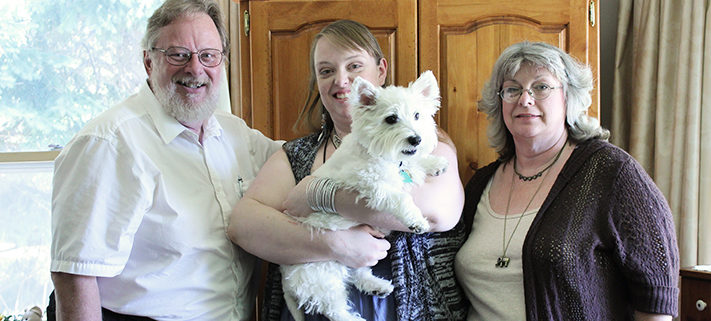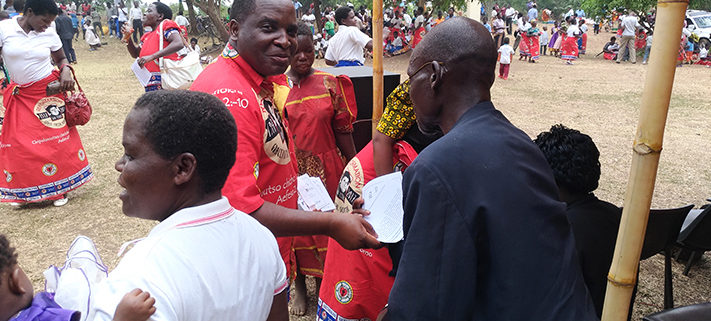For 50 years, Linda, Sue, Lois, Judy S., Judy D., Joey, Doris, Jan, Joan, Ella, Lois, Shirley and Sandy—aka the Chain Gang—have kept in touch with a chain letter.
Ann M. Ponath
These days any mail stamped and in your actual mailbox is a special treat. Most things in the mailbox seem to be ads, but imagine receiving multiple personal letters all at once from old college friends every few months for 50 years!
In 1963, ten women from six different high schools began college together at the old Milwaukee Lutheran Teachers College (MLTC). After two years in Milwaukee, the group moved on to Dr. Martin Luther College (DMLC), New Ulm, Minn., completing their teaching degrees in 1967. “Right from our freshman year, friendships were formed,” recalls Sue Rittierodt of Tacoma, Washington. “By our senior year, we were very close. On call night we all sat in a row—except those who were out student teaching—and some even held hands. As excited as we were to hear where the Holy Spirit would be sending us, we also were wondering where each of us would be.”
All of the letter writers received calls that night. “Many taught more than 20 years, some over 30!” says Rittierodt. “One has played organ for 50 years and is still playing! Many of us have changed careers and very successfully. We all served and still serve our congregations in some manner.”
The group decided to start writing a chain letter when one of their friends died in her sleep four months after graduation. They wanted a way to always keep in touch.
Rittierodt explains how the process works: “I send my letter to my friend. She reads my letter, writes one of her own, and sends my letter and hers to another friend. This friend reads the two letters, writes one of her own, and mails all three letters to another friend. This goes on until it all comes back to me. I throw out my letter and put in a new one, and it starts all over again.”
Even when several friends took calls overseas, they were not forgotten. “When Linda and Lois took a call to Hong Kong, we did not include them in the chain letter, but each individually wrote to them, using the special blue airmail paper,” says Rittierodt.
Over the years, these friends have grown into wives, mothers, and grandmothers. Together they celebrate 35 children and more than 50 grandchildren with more on the way. “In the early years, when we were all busy teaching multi-grades, singing in choir, teaching Sunday school, and whatever new teachers were asked to do, the letters would get around in six months or so,” says Rittierodt. “Then we got married and had children and new activities to keep us busy. Once our children were grown and we had more time, the letters would get around much more quickly. When two of our group received their crown of glory, we asked two others to join us—they have blended right in.”
Now the women are scattered from Washington to Arizona, Michigan, Illinois and Wisconsin. “When Lois and Linda came home from Hong Kong on furlough, we had a big gathering. The last several years we also have been blessed to have weeklong retreats in Washington, Florida, northern Michigan, and rural Montana,” says Rittierodt. “We have daily devotions, we sing, laugh, play cards, laugh, tour the area, laugh, attend a local church, laugh, take turns making meals, and eat chocolate.”
“We have a lot of fun and laughs when we get together,” says Ella Behrens, Crystal Lake, Ill. “There are plenty of women in our group who have a wonderful sense of humor. It doesn’t take much for the group to break out in song. We love to remember and talk about fun times from the past.”
The friendships expressed in this letter have been a definite blessing to these women. “I can’t begin to express what I feel when that letter shows up in my mailbox,” says Rittierodt. “It brings an immediate smile, and for me, everything is set aside and I open that packet and read each letter, sometimes twice.”
The letters came in good times and in bad. “Over the years, we have all had difficulties in our lives: parents died, a granddaughter died, four spouses, two sons, a daughter-in-law. Knowing these women are praying for me is such a comfort,” says Rittierodt. “Letters often include favorite Bible passages, hymn verses, and encouraging words. Our faith shines through in all our letters—it might just be thanking God for a beautiful fall. Many letters are addressed to ‘My Sisters in Christ.’ I never had a sister growing up; now I have ten.”
Linda Philip of Kirkland, Washington, recalls, “As the years have gone by, the letters include more and more words of God to lift one another’s spirits as we have gone through trials, health issues, and deaths of loved ones. I remember one specific wrenching sadness when one of our sister’s grandchildren was very ill, and she sought our prayers for strength. I know the letters were comforting especially after losing the young child.”
“For me personally I received extra comfort from these friends four years ago when my husband went home to heaven. Sadly, again this year, my oldest son entered heaven. Again my dear friends were here for me and our family. Bible verses flow so easily, and to see them in someone’s handwriting becomes so personal,” says Judy Diener, Plymouth, Wisconsin.
Lois Reichers of Peoria, Arizona, adds, “When I have sorrows in my life such as the sudden loss of my husband, I know these friends are there with their prayers and support! They are also there to share in my joys—births of children, grandchildren and marriages! Such a blessing!”
Lois Tackebury, South Lyon, Michigan, is also grateful for the letters. “Every time I receive the packet it is a special time. I feel blessed to know I am connected to these Christian friends though separated by miles. . . . The letters have actually brought us all closer than when we were in college.”
“The letters mean hope, love, support, and encouragement from each dear Christian friend no matter the distance that separates us. The letters bring us all together in spirit and thoughts. We keep each other focused on our ultimate goal—eternal life with our Savior and reunion with all our loved ones who have gone before us,” says Ella Behrens.
Janet Kneser sums it up. “Wow. Now in our 51st year, there must have been hundreds of letters that have rotated. Sitting quietly to read the letters, it feels more like a personal visit with dear friends. Time and distance have separated us, but gratefully, the chain gang letter has kept us bonded in a Christian love that began as college classmates. Tears of joy and sadness are shared while the comfort of praying friends gives us encouragement. Though we do supplement our way of communicating with e-mail and a Facebook group, I think we gals will hold on to ‘snail mail’ writing until we are all in heaven!”
Ann Ponath is a member at Christ, North Saint Paul, Minnesota.
Do you have a manuscript, idea, or story from your own life you’d like to share for use in Forward in Christ or on wels.net? Use our online form to share it to our editorial office for consideration.
Get inspirational stories, spiritual help, and synod news from Forward in Christ every month. Print and digital subscriptions are available from Northwestern Publishing House.
Author: Ann M. Ponath
Volume 105, Number 3
Issue: March 2018
Copyrighted by WELS Forward in Christ © 2021
Forward in Christ grants permission for any original article (not a reprint) to be printed for use in a WELS church, school, or organization, provided that it is distributed free and indicate Forward in Christ as the source. Images may not be reproduced except in the context of its article. Contact us







